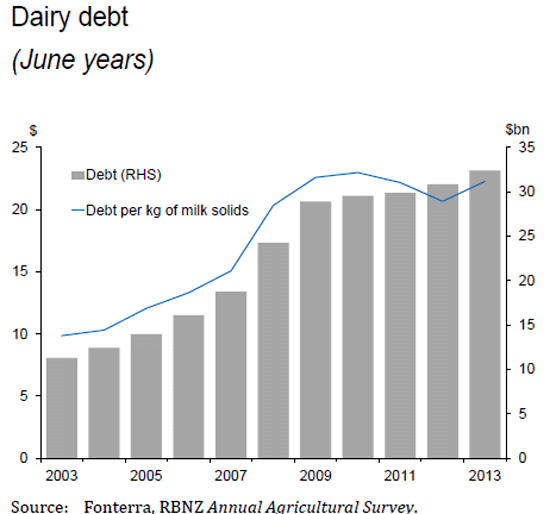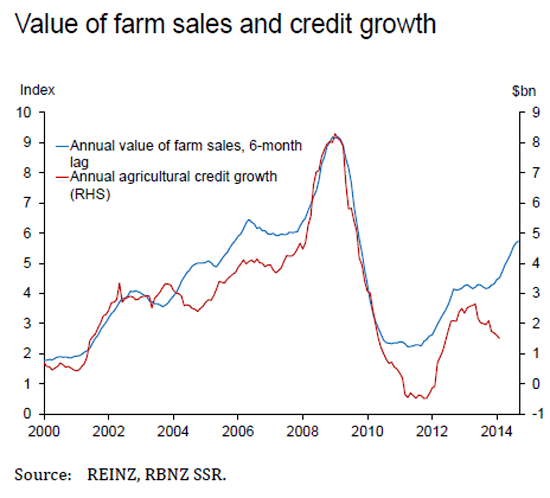
By Gareth Vaughan
Nearly 70% of the $32 billion worth of dairy farm debt is on floating mortgage rates, the Reserve Bank says, meaning rising interest rates are likely to increase financial stress if incomes fall.
In its May Financial Stability Report the Reserve Bank, which has lifted the Official Cash Rate 50 basis points to 3% so far this year with more increases expected in a lengthy tightening cycle through 2015, also suggests milk payouts for the 2014-15 dairy season will be "materially lower" than in the current season.
"High debt levels increase the sensitivity of rural borrowers to a substantial decline in farm commodity prices, declining land prices or worsening climatic conditions. With dairy production techniques becoming more intensive, the implied ‘breakeven’ milk payout for individual farm profitability has increased over time," the Reserve Bank says.
"A significant decline in the milk payout would place some highly indebted farmers under financial strain, and illiquidity in the farm resale market could reinforce falls in the value of farm land. The decline in dairy auction prices this year suggests the 2014/15 milk payout will be materially lower than for the current season. In addition, with close to 70% of dairy debt on floating rate mortgages, rising interest rates could increase any stresses should incomes fall."
"With export prices currently high, there is a risk farmers undertake borrowing decisions assuming that prices remain elevated, and that these expectations are capitalised into higher farm land prices," the Reserve Bank warns.
New Zealand's terms of trade, a measure of the purchasing power of New Zealand's exports abroad, have been at a 40-year high. In the December quarter seasonally adjusted dairy export values rose 27% accounting for 39% of the value of goods exported, which was twice as much as meat and forestry combined.
In late February Fonterra increased its forecast Farmgate Milk Price for the 2013/14 season by 35 cents to a record level of $8.65 per kilogram of milk solids. It was the third increase in Fonterra's current financial year, which runs to July 31, after the dairy co-operative initially picked a price of just $7.50 last July. The increase, along with a previously announced estimated dividend of 10 cents per share, amounts to a forecast cash payout of $8.75, which Fonterra says represents $13.8 billion for farmers. Last season’s final Fonterra cash payout was $6.16 per kilogram of milk solids.
Economists see Fonterra payouts around $7 next season; Just 10% of farmers hold half the debt
However, Fonterra's fortnightly dairy auctions so far this year have seen dairy prices drop 27.5% in New Zealand dollar terms, and 22% in US dollar terms. Economists are picking a significant drop in payouts for 2014-15.
Westpac senior economist Anne Boniface has a $7.10 forecast, and ASB chief economist Nick Tuffley and rural economist Nathan Penny a $7 one. Tuffley and Penny point out, however, even this level still represents a "top four season" when looking over Fonterra's history. Fonterra will announce its opening forecast for the new season at the end of May, and update its forecast for the current season if it changes.
Speaking to journalists after the release of the Financial Stability Report, Reserve Bank Governor Graeme Wheeler noted a "tricky issue" is that around half the $32 billion of dairy debt is held by just 10% of dairy farmers.
"That leaves them vulnerable if there were to be significant reductions in the milk price payout and declines in international dairy prices for dairy products, and if that started to feed through to the price of farm land and that sort of thing," said Wheeler.
However, in recent times he said dairy farmers hadn't been taking on much new debt. Reserve Bank sector credit data shows agriculture debt up just $62 million in the March quarter to $51.910 billion. The Reserve Bank says in the March quarter banks reported demand for agricultural credit increased significantly less than they had expected six months earlier.
Rabobank NZ CEO Ben Russell told interest.co.nz earlier in the week his bank's gross lending contracted in the March quarter because of big increases in customers' payouts from Fonterra. Russell said these were up about $200 million, or 60%, year-on-year in the March quarter.
Meanwhile, Wheeler said the Reserve Bank had noticed a lot of new building permits in the rural sector, and a lot of dairy farm development taking place.
"But you're not seeing a rapid increase in credit to dairy farmers. So it does suggest that a lot of the expansion works that are taking place on farms are taking place through retained earnings in the high incomes that have been generated in the dairy sector," said Wheeler.


5 Comments
To pay that debt back you have to have capital, stuff you have paid tax on. To pay back the 32 billion you need to earn 50 billion as you owe over %30 to the government along the way.
And to compound the impossible task outlined in your post - we must never forget Muldoon's "just-this-once" Provisional Tax - which became the imbedded punitive monster that it now is.
Billions must be paid prior to actual earnings.
Substitute 'billion' in your post with the word 'thousand' - and you transfer the situation to perhaps a million Kiwi families who own small business.
Thousands must be paid prior to actual earnings.
"Just this once!!!"
Provisional tax is a nightmare, they should cut it out. How the hell we let ourselves be conned into estimating our income and paying tax on in advance, with a penalty if you get it wrong, I will never understand.
I wonder where this idea went..which would help -
To address these concerns a government discussion document, Making tax easier for small businesses, was released on 17 September 2003. The proposals contained in the discussion document included aligning the provisional tax and GST payment dates and providing another means to calculate provisional tax by basing provisional tax payments on a percentage of a business's GST turnover.
"I will never understand". (Me too)
When Provisional Tax changed from being "just this once" I expected the accounting profession to take on IRD - on behalf of their clients - to have it halted.
I was very young and stupid. The accounting profession saw Provisional Tax as a business builder (unproductive) - for themselves!
We, as a nation, sit and wonder why so few NZ small businesses become large businesses. The answer is simple.
Stolen business cash surpluses that should have been business expansion capital for increased production.
I will never understand - how they got away with it.

We welcome your comments below. If you are not already registered, please register to comment
Remember we welcome robust, respectful and insightful debate. We don't welcome abusive or defamatory comments and will de-register those repeatedly making such comments. Our current comment policy is here.